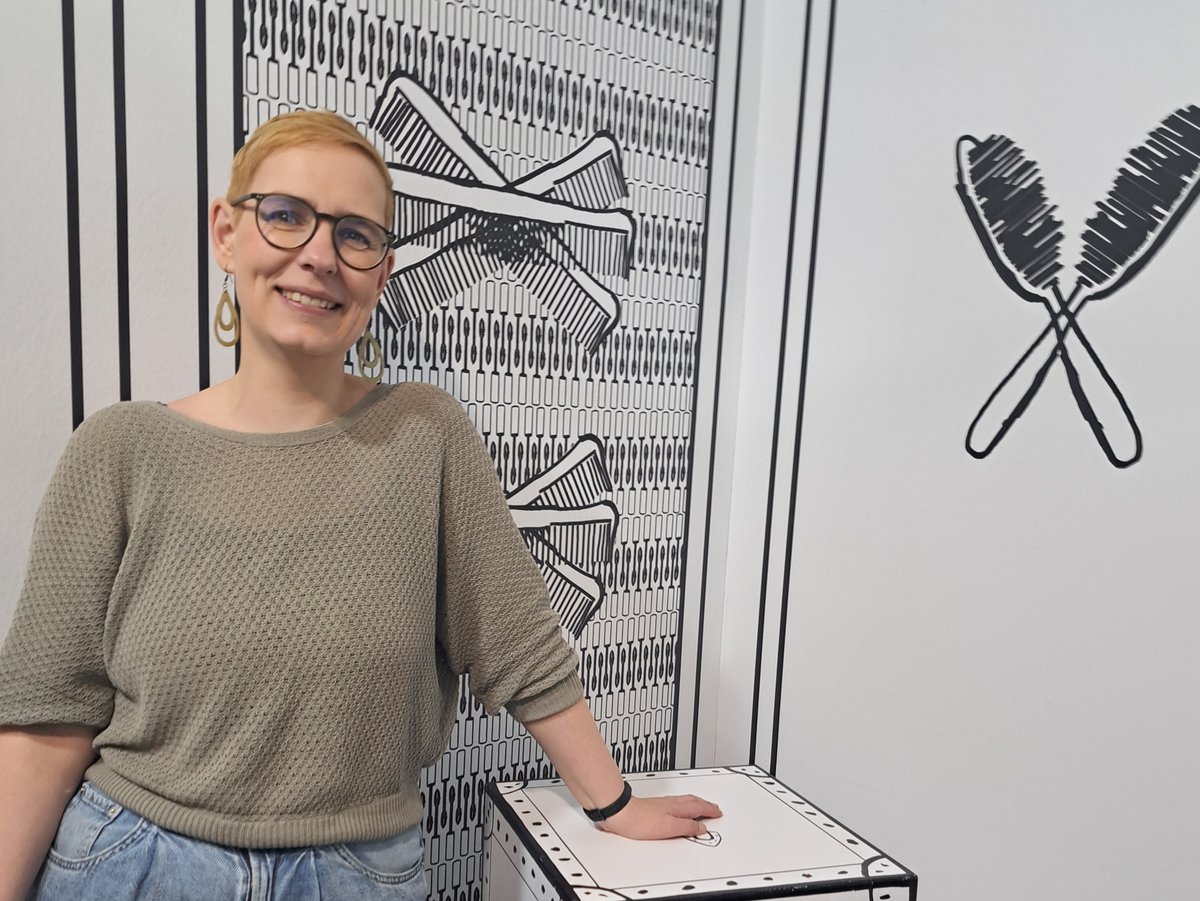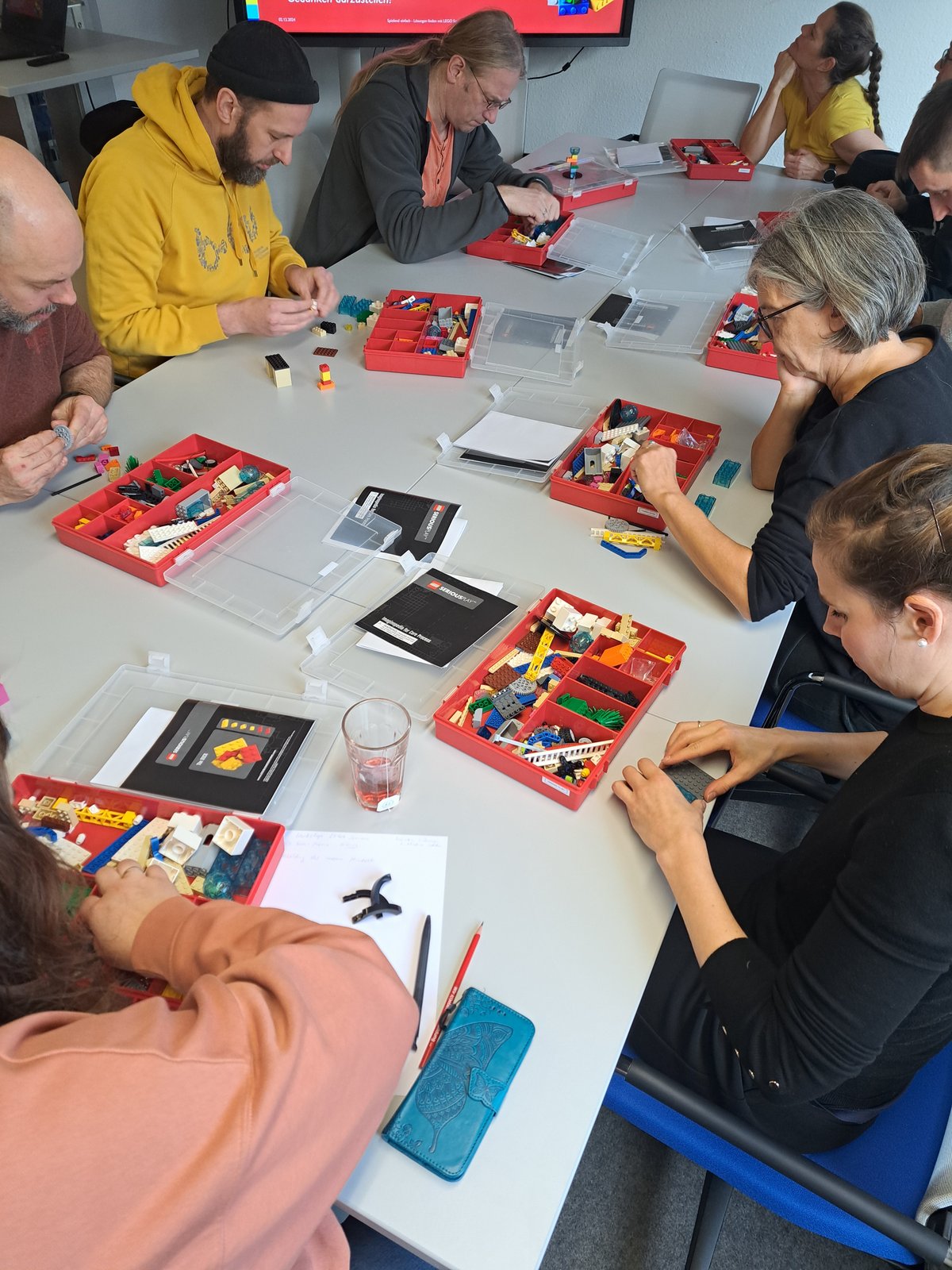Interview with BTU alumna Eva-Maria König (Culture and Technology)
Eva-Maria König studied Culture and Technology at the BTU in Cottbus and then worked in project management. She also gained additional qualifications as a media educator and lecturer in adult education. She now works at the Centre for Continuing Education at BTU and also freelances. Here she has recently started organising workshops on LEGO Serious Play. In this interview, she explains what this is all about.
Hello Mrs König, you studied at BTU, how was your experience here?
I really enjoyed studying at BTU. I liked the small, well-organised main campus - and that you could talk to professors and lecturers directly. Many of us knew each other by name and you could always meet someone to go to the cafeteria with or just sit in the sun. There was often a much more intensive dialogue, especially in the small seminars. And my student life was anything but boring - there's a lot going on in Cottbus if you have the right people around you.
After graduating, you trained as a media educator alongside your job in project management. How did that come about and how did your studies perhaps help you?
I studied "Culture and Technology" - that's the study programme where every second person asks you: "And what do you do with it?" And to be honest, I didn't really know myself at the time. I just found the subject exciting and always tended to follow my interests. Looking back, however, there is a common thread running through my career. After graduating, I first did a 1.5-year trainee programme at the Lausitzer Rundschau newspaper. I then found a position in an Erasmus+ project - it involved developing an e-learning platform for educators to promote media skills in children. In Erasmus+ projects in adult and vocational education, you work together with partner organisations internationally, i.e. across Europe. The project results - in our case the eLearning platform - are prepared in several languages and made freely available as open source materials. It was not only exciting from a professional point of view, but also a really enriching time on a personal level. I was able to travel a lot and attend international team meetings - for example in Lisbon, Bratislava, Stockholm, Belgrade, Greece, the Netherlands and Bulgaria. It was a whole new dimension of collaboration for me: intercultural, creative and on an equal footing. And it made me realise once again how much you can learn from each other when you think outside the box. At the same time, my company at the time also offered on-site training for educational staff. I basically grew into several roles at the same time - project management, Media Pedagogy and also the role of lecturer. I definitely benefited from my studies: I learned to quickly familiarise myself with new topics and to organise myself well. There was also a lot of overlap in terms of content - for example, when it came to how technology and digital media influence our communication and culture. I still regularly use this basic understanding from my studies in my workshops and further training courses. I am generally a person who really wants to understand things - so it quickly became clear that I wanted to acquire extra-occupational Media Pedagogy and didactic knowledge. I therefore did further training to become a certified media educator and also completed a qualification as a certified lecturer in adult education. Fortunately, my employer at the time fully supported this endeavour - that was a great help and paved the way for me to be able to work freelance in this field today. I was involved in three Erasmus+ projects for a total of almost six years - all with the common goal of funding media skills for adults.
You now also work at BTU in the Centre for Continuing Education. What is the centre, who is the target group for the training courses there and what exactly do you do here?
Exactly, I now work at the ZWW - and also freelance as a media educator and lecturer. The Centre for Continuing Education offers a wide range of courses: There are internal training courses for BTU employees, but there is also a lot on offer for companies and institutions in the region - from language courses to comprehensive certificate programmes. We also fund lifelong learning with our "Open University" programme - in other words, continuing education for everyone. And then, of course, there are also externally funded projects in which we develop new, innovative continuing education formats. I myself work on the ESF project "Future Skill Readiness for University Staff in Brandenburg", FSR@BB for short. We are developing further education programmes for teaching staff and advisors at Brandenburg's universities - with the aim of making specialist staff fit to prepare students for the future in the best possible way. Future skills such as media competence are at the centre of this.
You have also recently started giving workshops on LEGO Serious Play. How did that come about and what exactly is it?
I gave the first LEGO workshop in December 2024. The ZWW had offered the format before, but was looking for a new lecturer - that's where I came in. I hadn't even heard of LEGO Serious Play (LSP) before, but I was immediately intrigued by the concept. And what can I say: it lives up to its promise. The method was originally developed by the LEGO Group in the 90s for strategy development in companies and has been open source since 2010. It's about thinking with your hands - in other words, not just describing complex thoughts, ideas or visions, but making them visible and tangible with LEGO models. You don't build what you see, but what you think. The focus is always on a specific question or challenge. In May, for example, I will be leading an LSP workshop at the University:Future Festival, where we will consider together what an ideal learning space looks like in which future skills are really funded - and what role teachers play in this. LSP makes it possible to bring abstract concepts such as collaboration or reflection to life. It creates a creative atmosphere in which everyone can get involved - regardless of hierarchies or prior knowledge. For me, this is a great addition to my previous methods in adult education.
Not only do you work in a lifelong learning centre, you are also constantly training yourself. How do you motivate yourself to do this and what are the challenges of self-learning?
I am simply someone who needs to understand things. If I'm interested in a topic, the motivation to learn comes automatically. I mainly use low-threshold formats for this - podcasts, YouTube, books - but I get the most out of interacting with other people. This can happen at conferences or in traditional courses. For me, it doesn't feel like further education at all - it's just part of my everyday life. I also want to pass on this joy of learning as a lecturer. Of course, there are also topics that are less exciting - for me, these are mostly bureaucratic or administrative things that are part and parcel of public service. I find it more difficult to motivate myself. But in the meantime, I've learnt to simply get things done "listlessly" - and then be happy when they're ticked off.
What do you miss most from your periods of study at BTU?
Above all, I miss the freedom to organise my own time. Back then, that gave me an incredible amount of space to deal with topics at my own pace. I also found the independent work very enriching - you could think deeply about content and had the opportunity to pursue your own ideas. I also particularly enjoyed the intensive dialogue with fellow students, friends and lecturers. These conversations - whether in the seminar or simply over a coffee - had a huge impact on me both professionally and personally. And last but not least: I simply had more time to read back then. Without any pressure, simply out of interest and curiosity. I sometimes miss that in my everyday life today.


